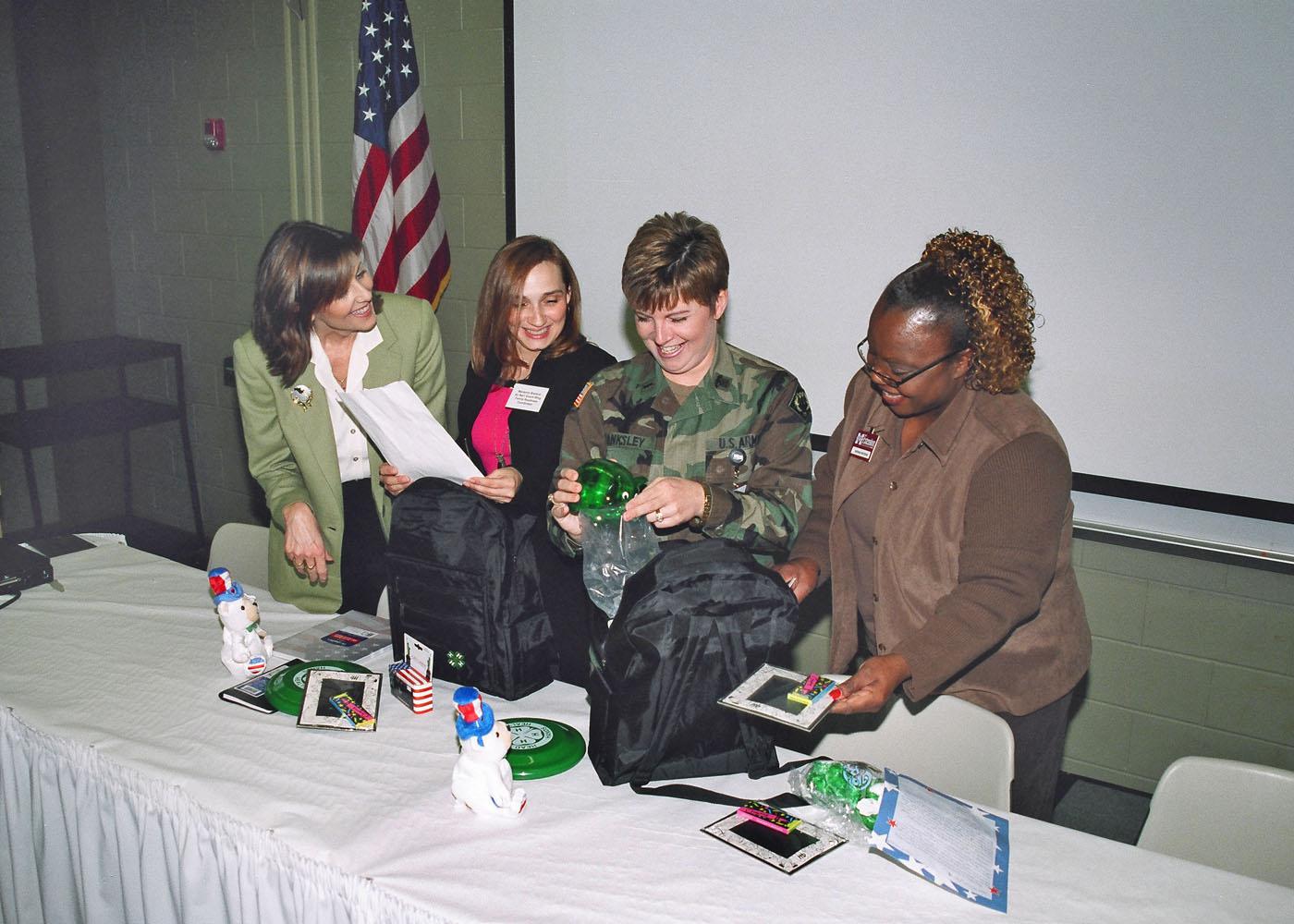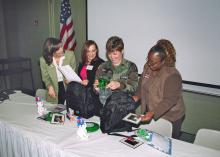Information Possibly Outdated
The information presented on this page was originally released on February 3, 2005. It may not be outdated, but please search our site for more current information. If you plan to quote or reference this information in a publication, please check with the Extension specialist or author before proceeding.
4-H takes aim at military kids
MISSISSIPPI STATE -- Mississippi's military families are finding a non-military organization in every county that is ready, willing and able to mobilize an army of volunteers to provide support for their children.
The Mississippi State University Extension Service 4-H program has received $30,000 for 2005 to expand youth development efforts among military families. The grant complements existing work taking place through a 10-year-old partnership between the U.S. Department of Agriculture and the Army, as well as similar efforts in recent years with the Air Force.
Rae Wilkinson, a 4-H youth development professor with MSU's Extension Service, said the 4-H/military partnership began a decade ago to provide smoother transitions for families when they relocate to other bases. A $23,000 grant last year through the Children, Youth and Families At Risk project, part of the MSU Extension Service, enabled Mississippi to intensify efforts on the state's military bases.
"The need has never been greater than it is today, especially for these families coping with the stress and uncertainty of deployments," Wilkinson said. "4-H offers a structured support system that is already in place and ready to assist youth in military families and their parents."
Whitney Mathis, Extension associate for the 4-H Military Project, said 4-H can be a vital component of family support groups all across the state.
"Part of our goal is to provide youth development activities during family support group meetings. While adults are taking part in discussions, their children can be working on a variety of projects that will help them cope with the absence of a parent," Mathis said. "Some may become involved in 4-H photography or computer projects, such as Web site development. Others may seek out horticulture projects like landscaping the local armory. We want to help youth find an enjoyable activity that will help them cope with the stresses they may be feeling."
Mathis said the Extension Service also can provide resources for the adults to help with issues such as money management, parenting skills, separation anxiety and reunion stress. 4-H will be enlisting volunteers to assist with the military project in every Mississippi county.
Chief Melissa Tanksley of Mississippi's National Guard said more than 3,500 soldiers have been deployed from across the state since the first of the year. She estimated about 7,000 children are affected in that group. About 2,500 soldiers are home or coming home from assignments.
"We have a huge education process taking place. Career military families tend to have better supports in place, but the Guard and Reserve families often feel isolated," Tanksley said. "Some of the children affected may be the only ones in their classrooms who have a parent deployed. Their teachers and child-care workers need to understand what to watch for and be prepared for behavior changes."
Tanksley said families of the National Guard and Reserve may not discuss family issues related to deployment with their children until departure is eminent.
"It's easy for some families to be in denial that deployment will happen to them; then when it does, they are devastated," Tanksley said. "Families need as much communication as possible to help address their concerns before, during and after deployment."
Tanksley took part in a recent advisory committee meeting to organize the 4-H involvement with military families. In addition to Tanksley and Extension professionals, participants represented the Air National Guard, the Army Reserves and Keesler Air Force Base.
Juanita Warren of the Army Reserves estimated at least 5,000 Mississippi children are affected by deployments of reservists.
"The military likes to think we can take care of our own, but the truth is we need help," Warren said. "I also believe many hands make light work. We need to work together."
Marianne Breland of the Air National Guard said their military personnel tend to be very spread out, which increases the need for community support.
"Air National Guard deployments usually are different from some of the other groups; assignments may be shorter in duration but occur with less warning. Children are sometimes forgotten in the middle of the hectic activities of deployment," Breland said. "Military parents experience pressure to be strong, but some face a confusing reversal of roles as children help console parents."
Sheran Watkins, 4-H youth agent in Harrison County since 1994, knows the needs and challenges facing military families. In addition to overseeing the 4-H clubs at Keesler Air Force Base, she was deployed during Operation Desert Shield/Desert Storm in 1990 to Saudi Arabia for 10 months.
Watkins joined the Army Reserves as a means of paying for college. Married and with a 6-year-old son, she had 72 hours to prepare for her deployment. Her husband's offshore job meant that her mother had to assist with child care every other week.
"Our marriage survived the experience, but it took effort. Stress does not necessarily end when families are reunited," Watkins said. "Families usually need something to help get their mind off the military situation, and 4-H is a perfect fit. For one thing, it's affordable. Free."
Watkins said 4-H offers something for everyone. If parents are too busy and cannot take children to club meetings, the youth can be individual 4-H members and work on projects on their own. The 4-H military project also provides adult volunteers with fulfilling opportunities.
"Helping others is an excellent way to distract from problems or worries, and volunteering is a great way to support our military families," Watkins said. "Whatever skill you have to offer, 4-H and our military families need you."
Contact: Whitney Mathis, (662) 325-1693



